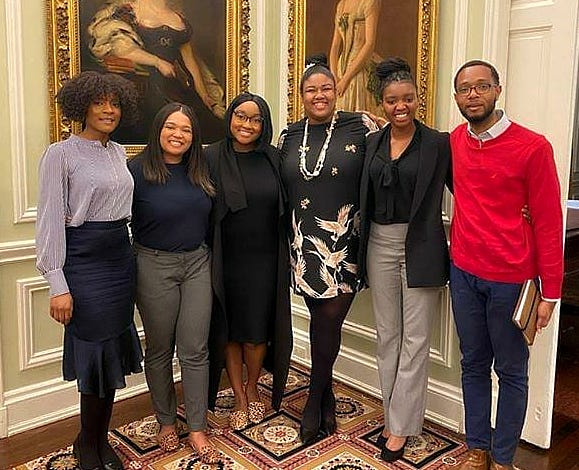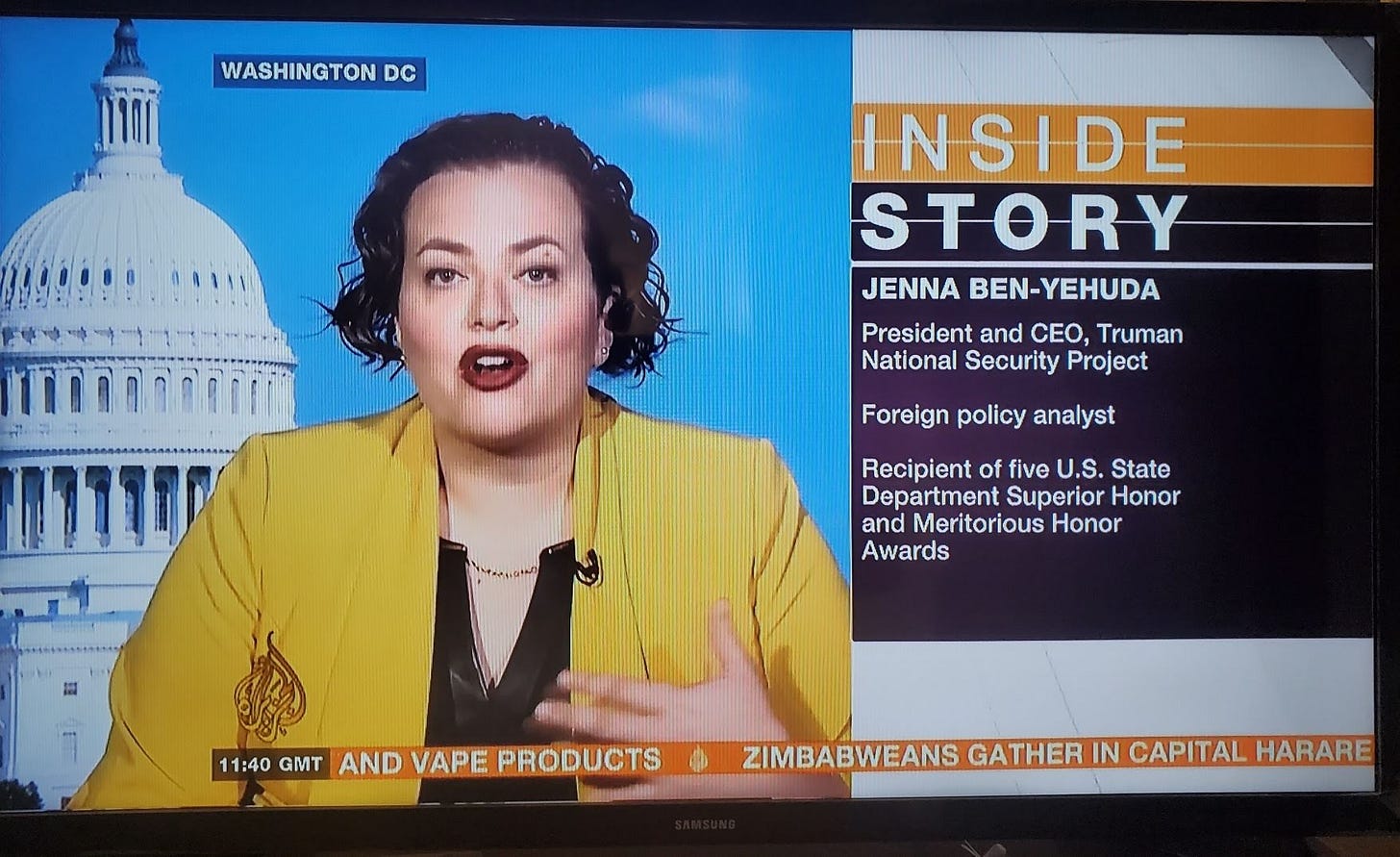Preview: Q&A with Jenna Ben-Yehuda
ICYMI: Foreign affairs and comms strategist Alexandria J. Maloney on being inspired by 'so many dynamic Black women in the National Security field'
The perfect Friday afternoon read. Remembering first impressions (“Haiti really grabs you by the collar, and I loved it!”); nearly wiping out on the over-waxed floors while saying ‘hi’ to MSEC Condi Rice in an otherwise empty hallway at Main State; and “Harriet the Spy” — Jenna Ben-Yehuda and I cover it all.
Part I of my conversation with the president and CEO at the Truman National Security Project & the Truman Center for National Policy will be available to paid subscribers this afternoon. In Part II, coming onMonday, we discuss the new team in charge in Foggy Bottom and the big policy decisions they face. We also talk about parenting during a pandemic, including what — if any — lasting impact this period may have on that ever-illusive work-life-balance.
Below is a free preview.
When and how did you know you would be at home in the world?
Growing up as the granddaughter of a Holocaust survivor, I was acutely aware of how directly my family's own history and frankly, survival, was tied to U.S. policy decisions. Somebody allowed my grandfather through a port of entry and helped to resettle him, and that’s why I'm here.
And so in terms making policy relevant to the American people, there is this really intensely direct and personal touchstone. And then, you know, as an American Jew, you grow up with this constant reminder of of the Holocaust. And I grew up at a time when survivors were certainly much younger than they are now. And people were telling their stories and it was very close at hand.
And then the other thing I was thinking about this morning as I was looking over the questions was that I first went overseas when I was 16 on a Fulbright with my history teacher in high school and the common language, much to my surprise, which I shared with my host family was Spanish.
I'd taken Spanish as a child in California, like everybody else did. And it was the first experience where that skill brought connection, brought understanding, and it was in the place where I had least expected it in Hungary. I was trying to capture a couple of phrases in Hungarian, which is much more like Finnish than anything else and a really tough language. And then I got there and the father had worked for a Spanish businessman after the end of the Soviet Union.
Hungary was opening up in 1996, and so it was still relatively early and the family spoke Spanish because of the father's job. And I thought, ‘wow, if you can speak Spanish, not just in all these Spanish speaking countries, but then some of those people go to other places.’ As a teenager, it was my first ‘aha’ moment. I felt like I was onto something, like I had just unlocked this level on a video game and it just validated my love for the language and what it could deliver for me.
ICYMI: In Conversation with Alexandria J. Maloney

Foreign affairs and communications strategist Alexandria J. Mahoney talked with me on Thursday about everything from Susan Rice and the foreign policy heavy-weights she’s watching to how she pivoted after a big dream deferred. Alexandria is the lead contributor to “A Black Girls Guide to International Affairs Opportunities” and the founder of “The World is Watching BLM,” an all-volunteer global coalition in support of the global Black Lives Matter movement that provides resources to BLM organizers abroad. Below is a free preview of our chat. Check out the full conversation.
What have been some of the most rewarding moments in your career? And the most surprising?
This may sound corny, but what has been most rewarding in my career thus far is seeing the fruits of my labor in helping others. Seeing my peers and mentees with organizations like BPIA and WCAPS feel inspired and able to pursue their dreams, connect them to potential jobs, and help the younger generation find their path.
Most surprising? Being selected as a Forbes Under 30 scholar and the 2020 Distinguished Alumni for my alma mater, John Cabot University. I’m the type of person to keep my head down and do my work, so receiving attention for the behind-the-scenes work I’ve been doing is very humbling.
Who inspired you when you were just starting out and who is inspiring you now?
Susan Rice has been one of my role models for as long as I can remember. Relatively younger than many of her counterparts early in her career, Rice commanded the respect and authority of her peers.
I’ve always been in awe of her brilliance, diplomatic savvy, and her legacy of implementing some of the most important foreign policies in her decade of service.
I’m inspired by so many dynamic Black women in the National Security field, Amb. Gina Abercrombie-Winstanley, Amb. Sylvia Stanfield, Amb. Bonnie Jenkins, and Chief Rita Sampson.
Ready for some weekend links?
Here are a few recent stories I’ve enjoyed, found useful, or have been on mind:
Gone But Not Forgotten (Foreign Affairs)
Biden’s U.N. Pick Assembles Team of Foreign-Policy Veterans (Foreign Policy)
What Linda Thomas-Greenfield's hearing says about US leadership at UN (Devex)
Biden rescinds abortion restrictions on US foreign aid (ABC News)
Here are some tweets I saved for you:
POTU’S heading to Foggy Bottom on Monday. And on Tuesday, daily pressers return.

Rallying the pros for Rob Malley, Biden’s pick for special envoy on Iran (who will not require Senate confirmation, FYI).


More on Malley (Thread):

Speaking of rallying:

Ready, Set…. Which world leaders hasn’t the new Secretary of State talked to since winning Senate confirmation (by a very comfortable margin) earlier this week?

Upcoming Conversations:
Former Ambassador Gina Abercrombie-Winstanley
Former Ambassador Dana Shell Smith
Foreign Service Officer and Rusk Fellow Heera Kamboj
Former Ambassador for Global Women's Issues Melanne Verveer
Retired senior Foreign Service Officer Virginia Bennett







